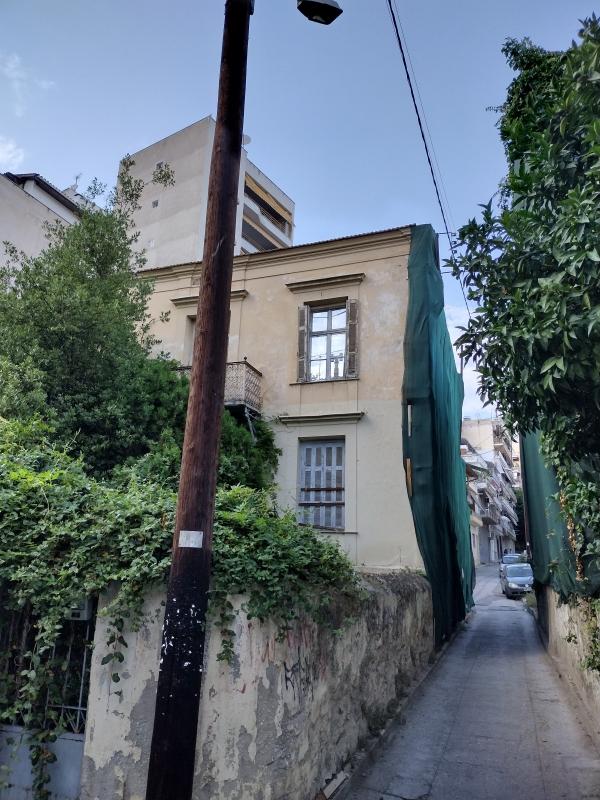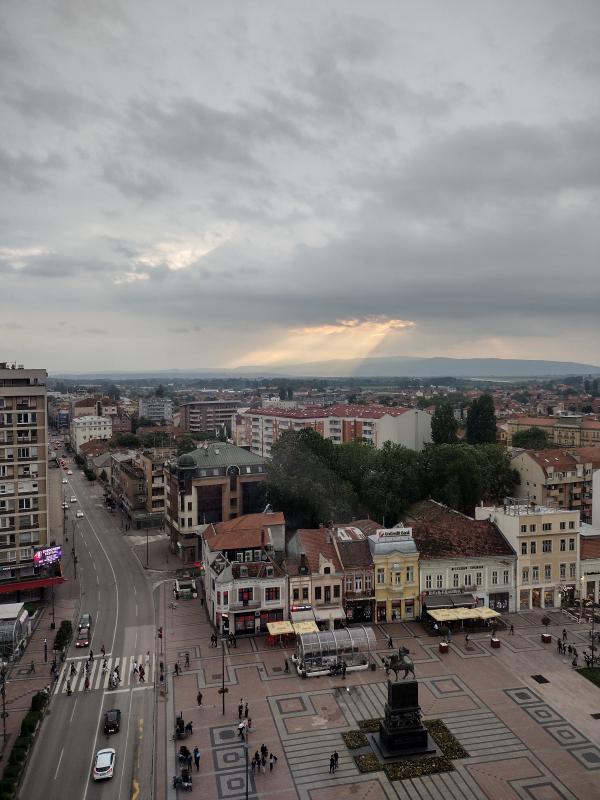|
So there we were, rib-deep in warmish water, leaning farther and farther back as the shadow of the awning shrank. There was a heatwave in western Bulgaria. A whole week of 33, 34, 35 degrees. The sun droned in your ears and the white sky clamped down and bore you to the ground. We went to the swimming pool. Kyustendil has some great pools, and my favorite is at the hotel Strimon. It has sun-shades, there's no loud music playing, and they serve cocktails. On this particular day, I wasn't knocking back pina coladas because it was like 11am, but I was reading a novel while my kids and their cousins swam around screaming. I told them I was waiting for my sunscreen to dry. Pavlina got out of the pool and told me that Ellie had made friends with a little girl visiting from America. Let's go meet her dad. I was excited, but also, let's say, on a higher level of alert. Ellie's in first grade, and she makes friends both more easily and in the same way as me. It's the same because we know it's more fun to play than to sit by ourselves, but we're afraid that the other person won't want what we have to give. The way Ellie has it easier is that she's less practiced at protecting herself and doesn't get in her own way. I found the little girls grinning at the shallow end with their hair plastered over their heads. I asked the normal questions —what's your name, how old are you? —and made my way to where Pavlina was talking to Ellie's friend's dad. They made it easy for me. What's your name? Where are you from? Where is your wife's village? What's your job? All I had to do is not hold back. There's a scene in the scifi cartoon Rick and Morty where Rick invites Bird Person to join him on his adventures through the multiverse. Bird Person doesn't say "no," but he doesn't immediately say "yes" either. He hesitates, and Rick takes it as a betrayal. Asking "will you play with me" makes you vulnerable, and so does answering "yes." You pass the ball back and forth, and you have to keep your heart open with each toss. Jose and his family lived in around Dallas, where he was an insurance claims adjuster. We determined that my wife's grandfather had a cousin in his wife's mother's village. This cousin had converted his living room into a rakia still, which was a fun topic of conversation. Jose planned to run in the Boston Marathon and I wanted to dig a barbecue pit somewhere. Jose ventured to share his political opinions, which shows he was braver than me, but at least I reciprocated. The sun moved and our patch of shade at the poolside got smaller and smaller. We emerged from the pool and ate pizzas together with our kids. We got together twice more — all ten of us plus cousins. We would have met a third time in Sofia, but Maggie hit Ellie in the eye with a pear. Ellie was fine. Maggie still isn't allowed to watch videos. Pavlina has told me I seem standoffish in Bulgaria. I want to practice my Bulgarian, but of course English is easier. I hesitate, either because I'm mad at myself for resorting to English or trying to compose the appropriate response. It's a bad habit I'm trying to break down. Why, just today an old woman in the park saw me with my sketch book and said she had wondered where that sketchbook came from. I said, "It's from Slanchegled. The store," and she looked at me like I hadn't understood her correctly. But at least I didn't hesitate. *** It's summer and I'm not doing a lot of writing. Fellow Tetrapod is still available on Royal Road. The World's Other Side is halfway edited and I'm expecting cover art soon. But I did read some stuff in July: The Assassins of Thasalon by Lois McMaster Bujold Another bland Penric and Desdemona adventure. There's an interesting idea at the core, but complications on that theme keep failing to happen. The characters are simply forced by the gods to go through the steps of the plot. When they hit a dead-end, they pray and the plot takes the next step by itself. There are a few surprises for the main characters, but no great agonies of choice. Neuropath by R. Scott Bakker You know the smart guy who sneers at happy people? They must not be smart enough to understand how bad the world really is. It isn't a position I respect. There is a lot of edgy two-thousands nihilism here, from predictions of a frozen Europe to preoccupations with sociopaths, terrorists, and MRI studies. Thank goodness for the Replication Crisis. I like R. Scott Bakker's work, but this is his worst book by far. It doesn't seem he had any fun writing it. I only finished it because I was in the bath and wanted to find out if the kids were okay. They weren't, and the author seems to suggest that that doesn't matter. Somewhither by John C. Wright What a lot of fun this book was. A teenage boy tries to save his crush from her mad-scientist father's "Möbius Coil," a portal to the Void of Uncreation. He fails, and something comes through from the other side. Damn good stuff! Imagine space-opera inspired by the edge-of-the-map legends of Medieval Europe. And some interesting thoughts on faith and fatalism. I devoured it in three days. Down and Out in Paris and London by George Orwell This is the sort of thing I like. What's it like to be chronically broke in 1920s Paris and London? Orwell'll tell you! He has strong opinions about it, too, which is understandable. The impression I got was that poverty in 1920s Paris made you nasty, whereas London made you dreary. The Man with the Silver Saab by Alexander McCall Smith Another cool, comfortable Varg book. Does he get a girl friend? Does he solve a crime? Is his dog going to be okay? Sort of. Mostly. Time Trials by M.A. Rothman and D.J. Butler I bought this book because I like D.J. Butler, but either he wasn't much involved in this book or he got lazy. The beginning is great – a bunch of interesting characters are thrown into the 31st century BC, where they have to save proto-Egypt from animal-headed aliens. I put up with the litRPG elements until I was about 80% of the way through the novel and we started yet another side-quest with an unclear connection to the main goal. I might have stuck it out if I'd had more faith in the authors' research. Aliens aside, I want to learn something real about Egyptian archaeology when I read a book about an Egyptian archaeologist. Alice and Bob Meet the Wall of Fire by Thomas Lin This is a collection of science journalism articles from the mid twenty teens. As such, it shouldn't be given a hard time for going stale. Science progresses. I think the most interesting and (relatively) evergreen theme was the debate between the physicists who hold to the "naturalness principle" (physics should be elegant) and those who don't. I would have liked to hear a more diverse range of scientists. We tended to get the same ones over and over. In all, I think I prefer PBS spacetime. Calisthenics Family First, I was running in the mornings. Next, I was swimming twice a week and making one chin-up attempt a day. Then, I searched youtube for Calisthenics instructional videos that weren't impossible or weird. Mission accomplished! I cycle through some good exercises and I have to admit, I now enjoy wearing a tight T-shirt :) Guillermo del Torro's Pinocchio I was feeling sick and my family was at a party, so I actually watched a movie. It wasn't bad. I respect the artistic vision and craftsmanship of Guillermo del Torro and the team he assembled. I especially recommend the behind the scenes video, with special attention to the value of mistakes and difficulties. The lessons of del Torro's story weren't baked all the way, and I prefer the lessons of the original story anyway, but I can respect this movie even if I don't agree with it. See you next month
0 Comments
So there I was, tramping the darkened streets of Niš, seeking medicine for my sick child. Do not imagine me limping with despair, but I did walk with a growing heaviness of step as certain facts made themselves clear.
The trip began well. We set out from Sofia and hit the Serbian border ninety minutes later. It was a ridiculously short trip to reach a foreign country, and by lunch-time we could stop at Kafana Kapica in Lukavica for the mixed meat platter and smoked beef. Niš was another hour north and west, where we'd arranged to meet my friend and colleague Artyom Trakhanov. Artyom is an artist and comic creator who specializes in horrified, yet determined characters rendered in chunks of massive black, as if stamped from carved wood. His pet project is called Slavic Nihilism, which, combined with the fact that he tends to position his camera above his head during calls, made me imagine Artyom as shorter and less cheerful than he actually is. Atyom led my family, his wife, and their friend around Niš, pausing for inspiration at each ugly patriotic statue ("a Deva with antlers!"). Of course, we talked about the situation in Russia. Artyom fled Saint Petersburg last year and now lives in Belgrade in an apartment building filled with a bunch of other "draft-dodgers" and an ironically pro-Putin Serbian land-lord. He just recently got a long-term residence visa, which we celebrated with Nikšićko beer, goulash, and artistic plans. More on those in the future. Ellie's digestive problems started on our post-lunch walk around the Niš Fortress. Pavlina nobly offered to take her home and let the rest of us go on, but when Maggie and I walked our friends to the train station and returned to the hotel, we found Ellie was still throwing up. When this sort of thing happens in Sofia, I know what to do: go to the pharmacy and buy suppositories.1 You don't want to vomit out your anti-vomit medication, do you? Then I went back out into the city, where my plans made contact with reality. The first fact which, like a block of inked cherry wood, impressed itself upon me was that pharmacies in Serbia do not work on Sunday evenings. Even the ones that google maps assured me were open were, in fact, not. I had no choice but to ask a human being for directions. The receptionists at our hotel told me there should be some 24-hour pharmacies (gestures) over there. I set off again, walking a circle from Sinđelićev trg to Kneginje Ljubice2 in search of lit, green crosses. Whatever Serbians with bellyaches do, it doesn't involve pharmacies. The three places that were even working sold nothing more powerful than diosmectite ("a natural clay that covers the intestinal mucosa"). Their other options ranged from activated charcoal to probiotics. These might have been helpful to my 8-year-old before she started vomiting every 45 minutes. I came back to the hotel after three hours of hunting with not much to show for it. My greatest victories were the successful purchase of an apple juice and the possibility for Pavlina to take half an hour of time to eat dinner while I read to Ellie. But actually, there's a bigger victory, which was my state of mind through all of this. A year ago, I would have compared what was happening (vomiting, no drugs) to what I wanted to happen (no vomiting, many drugs) and I would have despaired. Instead, I compared what I was doing (interrogating pharmacists) to what I would have done last year (giving up). Like one of Artyom's characters, I was horrified, but determined. If I didn't bring home the Golden Apples and the Living Water, I did bring home apple juice and smekta. Ellie stopped vomiting. Four days later. *** My observant readers might notice that this June newsletter has come to them in August. That's because my vacation arrived like a clap of thunder and suddenly I was in Greece. Boom! I was in the village. Crash! Sometimes there were twice as many children as usual. Bash! The time I had with my computer went to wrapping up Fellow Tetrapod and editing The World's Other Side. Yes, the serialization of Fellow Tetrapod is done. The whole thing is online for free, and you can read it here. If you want one big, convenient .mobi or .epub file, those are here. I would be very grateful if you could tell me what you think. I plan to edit the story once more than publish it on Kindle Unlimited, so whatever advice you can give me would be of great value and use. I'm also spending my time editing a story I thought I'd finished ten years ago. This is The World's Other Side, an alternate history in which the Gondwanans conquered the Northern Hemisphere. Five centuries later, Eurasia is a single enormous Gondwanan colony, but North America is a jigsaw of native nation-states. The story takes place in the struggling Ilinwa Republic, where a young man chooses between love and terrorism. It also has lightning-guns and flying cars. Check for it on Royal Road at the beginning of October, or my Patreon at the end of September. *** And I read some books The Hitchhiker’s Guide to the Galaxy: Hexagonal Phase: And Another Thing... by Eoin Colfer It's a story. Some interesting bones were there, although Colfer didn't seem willing to extend them. Instead he made lots of references to the previous Hitchhiker's Guide books. Buy this audio production only if, like me, you get shivers listening to the Journey of the Sorcerer. Resolved: Uniting Nations in a Divided World by Ban Ki-moon I wanted to know what it's like to be the UN Secretary General, and I got my answer. It's like constantly keeping up the appearance of being bland. Moon, in his own words, works hard, builds consensus, and avoids crisis. I do appreciate his use of the word "ulcerous" used to describe his work, and I enjoyed some of his diplomatic tricks. Now I know how to force an American president to sit through other people's speeches; schedule the president's speech last. Waybound by Will Wight What to say about the last book in the Cradle Series? I'm sad to see it end. Don't read this one until you've read the others. At that point, you'll have to read this one no matter what I say. I do wish that Wight had kept the these later books as tight as the first ones. Waybound (and Bloodline and Reaper) had so much going on its plot becomes like a checklist. We gotta kill this monster, then that monster, then some space monsters, and then we can relax. The questions of "how can a group advance together?" and "how do you stop yourself from becoming a monster?" are sort of answered, but only as engineering questions. Wight did loosen up and have some fun, but only outside of the goal-oriented segments. Awake in the Night Land by John C. Wright I re-read this after a conversation with a friend reminded me of the dark fantasies of R. Scott Bakker (The Prince of Nothing etc.) As angry as I still am at the rotten way that series developed, I still wanted some overwhelming odds and crushing black hopelessness. "Awake in the Night Land" is a good fit. The first story in the book is a work of art. I actually drew a sketch of Telemachos lying on the gray ash, surrounded by Silent Ones, one hand reaching toward a star. The other stories are worth reading, though repetitive. The fourth especially has scenes that are beat-for-beat copies of the first. "Silence of the Night" should have been folded into "Awake in the Night" to make a longer, deeper story. But anyway, I got my dark fantasy fix. Police Your Planet by Eric Van Lhin (Lester Del Ray) When I started this book I thought "for this sort of cyncisim you usually have to turn to the Strugatskies." We get American at the end, though, when the protagonist beats up his girlfriend and explodes some civic infrastructure for reasons of symbolic nation-building. These misdeeds might have been made to work (a burned-out policeman struggles with his belief in order and his hidden kink for mayhem?) but they didn't. The Making of a Chef by Michael Ruhlman I read this one after The Soul of a Chef, and it might be better to reverse that order. The Making of a Chef focuses on Ruhlman's experience at the Culinary Institute of America, while The Soul of a Chef expands outward into the restaurant business. Reading The Making of a Chef, I was mostly impressed by how much Ruhlman remembers. All the details about who said what and how exactly to grill that. Maybe he took good notes. Anyway, there are some fine characters, including Ruhlman himself with his "I'm just as much of a cook as you" machismo. I enjoyed that, even though I don't think I'll be able to replicate any of his kitchen techniques. Foundation's Edge by Issac Asimov The setup was great: a young politician, outraged at the plot holes of the previous Foundation books, finds himself teamed up with an elderly philologist on a hunt for the mythical human homeworld. But actually! Sinister telepaths! There is some fun to be had in watching Asimov write himself into and out of trouble, but he didn't care to tell us about mind-reading assassins and interstellar political intrigue. Instead, we get "the chair was antagonistic during my faculty meeting" and "what I did on my vacation in Bali." I didn't dig joining the hive mind either. Dungeons and Dragons My first Hollywood movie in quite a while, and it wasn't nearly as bad as I expected. I would have preferred more daring humor and magic, but there was a story there, and it was rather sweet. And I re-watched Princess Mononoke with Pavlina and Maggie. This time, it was the music that blew me away. The ominous swells of the strings under the contemplative tootling of the woodwinds. Like a cursed god heaving in the under-story. See you pretty soon. I'll write the July newsletter as soon as I can. 1 They are euphamistically called sveshtitsi in Bulgarian. Little candles. 2 In Bulgarian romanization, that would be "Sindzhelichev trag" and "Knyaginya Lyubitsa." Between the two versions, you can probably figure out the pronunciation. |
AuthorDaniel M. Bensen Archives
March 2024
Categories
All
|





 RSS Feed
RSS Feed